Environmental Science Posts on Crowch
When winter arrives in
Georgia, the Caucasus mountains transform into a land of quiet beauty and deep
tradition. Villages buried in snow become alive with warmth, laughter, and
ritual, as the people of the highlands preserve their ancient customs.
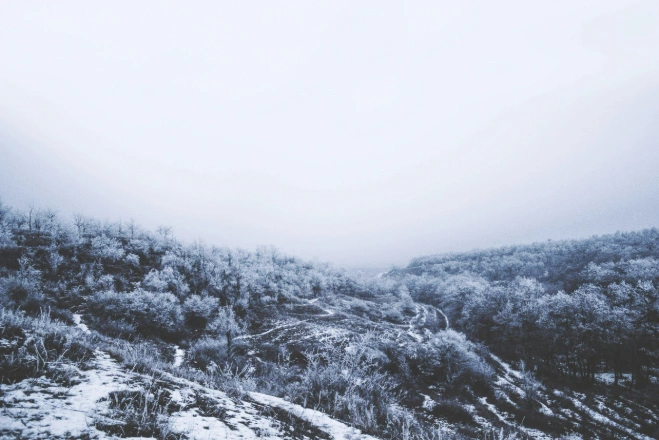
New Year Traditions in the
Mountains
In the highland
regions—such as Svaneti, Racha, and Tusheti—the New Year is celebrated with
special reverence. Families gather to bake gvinis khachapuri (cheese
bread) and prepare roasted meats, while the hearth becomes the heart of the
home. One of the most beloved traditions is the arrival of the mekvle—the
first guest of the year, who symbolically brings prosperity, happiness, and
good fortune.
Children sing carols known
as alilo, going door-to-door with candles and blessings, a practice
blending joy with spiritual devotion. These traditions, passed from generation
to generation, bring the entire community together in warmth despite the icy
cold outside.

The Role of Religion
Religion holds a profound
place in Georgia’s winter celebrations. The Orthodox Christmas, celebrated on
January 7, is marked by church services, processions, and candlelit prayers. In
mountain villages, people still carry ancient icons from home to home, blessing
families with the light of faith. Epiphany later in January completes this
sacred season, reminding Georgians of their deep ties to Christianity, which
has shaped the country’s identity for centuries.
A Season of Spirit and
Connection
Winter in the Georgian
mountains is not only about snow-capped beauty—it’s a time when traditions and
faith breathe life into the long nights. These rituals of togetherness echo
Georgia’s ability to blend history with modern identity.
And just as these mountains
echo with timeless songs, the world will soon hear new voices in Georgia’s
capital. Tbilisi will host Junior Eurovision 2025, a moment
when music unites cultures much like the winter traditions that unite Georgian
families. It’s another chance for the country to show its warmth, creativity,
and enduring spirit to the world.

votes: https://crowch.com/vote/2919/statistic/ https://crowch.com/vote/2918/statistic/ https://crowch.com/vote/2895/statistic/
Georgia is a small country with remarkable
seasonal variety, offering breathtaking experiences, vibrant festivals, and
unique adventures year-round. Whether you're drawn to mountain trails in summer
or wine harvests in autumn, there’s always more to discover. Here’s your
seasonal roadmap:
Spring(March–May): Nature Awakens
Spring ushers in blooming landscapes and mild
weather—perfect for exploring the great outdoors.
·
Best
experiences: Walking in Tbilisi’s Botanical Garden or
Mtatsminda and trekking through flower-flecked trails in the Caucasus
·
Where to
go: Kazbegi opens up as snow melts, while Kakheti flourishes in green—ideal
for exploring early wine regions
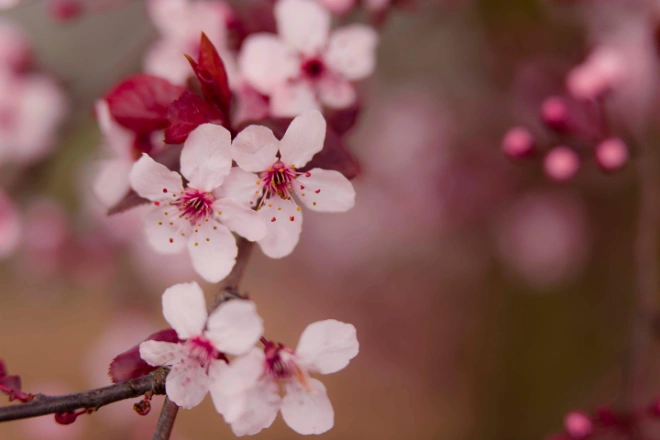
Summer(June–August): High Season for Mountains and Coast
Summer’s long sunny days make it Georgia’s peak
tourist season.
Highlights:
Mountains: Areas like
Tusheti and Svaneti open for trekking and exploration
Coast: Batumi comes
alive with beach culture, bustling promenades, and festivals
Weather: Expect highs
around 30 °C in Tbilisi, plenty of sun—pack layers for mountain evenings
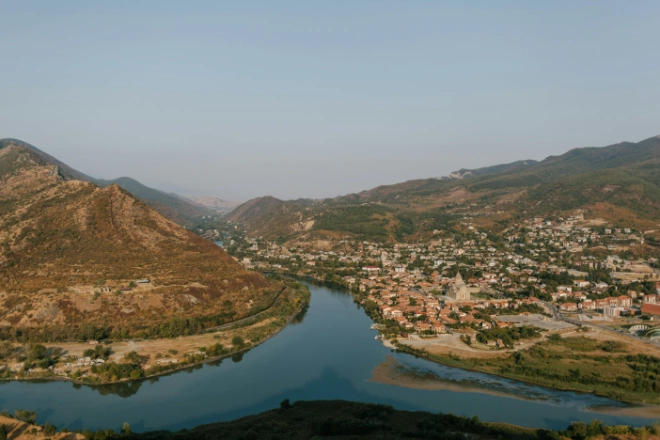
Autumn(September–November): Festive and Flavorful
Autumn is the season of golden foliage,
harvests, and cultural celebrations.
Festivals: Witness Rtveli, Georgia’s
festive grape harvest tradition, championed in wine regions like Kakheti
City
celebrations: Tbilisi’s birthday, Tbilisoba, fills streets
with food, crafts, and music
Wine
trail: Enjoy harvest beauty and wine tastings amid autumn colors in vineyards
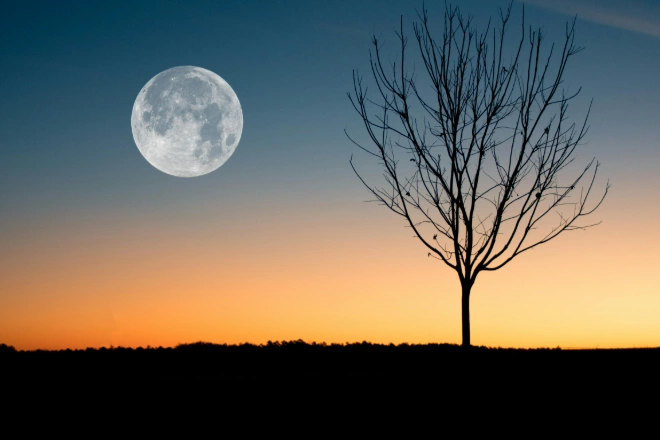
Winter(December–February): Ski Resorts & Cozy City Vibes
Winter transforms Georgia into a playground for
snow lovers and festive enthusiasts.
·
Skiing: Resorts like Bakuriani and Gudauri open up with
ski runs, snow sports, and alpine lodge charm
·
Urban
magic: Tbilisi stays lively with dual winter celebrations—Christmas and
Orthodox Christmas—plus candlelit markets and indoor warmth
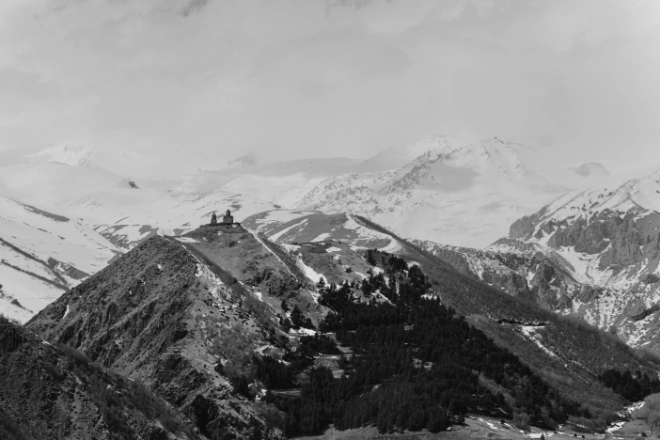
Why Visit Georgia All Year Round?
Each season in Georgia offers a different dimension—flower-filled
valleys, cultural festivals, mountain trails, or snow-laden escapes. And as the
country welcomes young artists and audiences for the Junior Eurovision Song Contest 2025 in Tbilisi, visitors can pair vibrant artistic celebrations with their seasonal adventures.
Votes: https://crowch.com/vote/2918/statistic/ https://crowch.com/vote/2907/statistic/
Georgia is a country of striking geographical diversity, which creates a variety of climates. From the subtropical coast along the Black Sea to the snowy peaks of the Caucasus, each region offers a unique experience for travelers and residents alike.
Regional Climate Overview Western Georgia (Black Sea Coast & Adjara): Mild, humid, and subtropical with warm summers and wet winters. Ideal for beach holidays and citrus growth.Eastern Georgia (Kakheti, Tbilisi area): Continental climate with hot, dry summers and cold winters. Famous for vineyards and fertile agricultural lands.
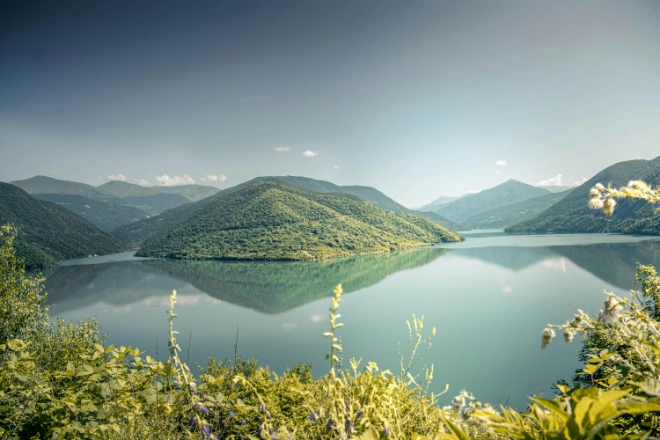
Northern Highlands (Svaneti, Kazbegi): Alpine climate with heavy snow in winter and cool summers, perfect for skiing and mountain adventures.
Central Georgia (Shida Kartli, Borjomi region): Moderate climate with balanced seasons, supporting forests, pastures, and mineral springs.Southern Georgia (Samtskhe-Javakheti): Cooler, highland climate with cold winters and mild summers, shaped by elevation and volcanic terrain.
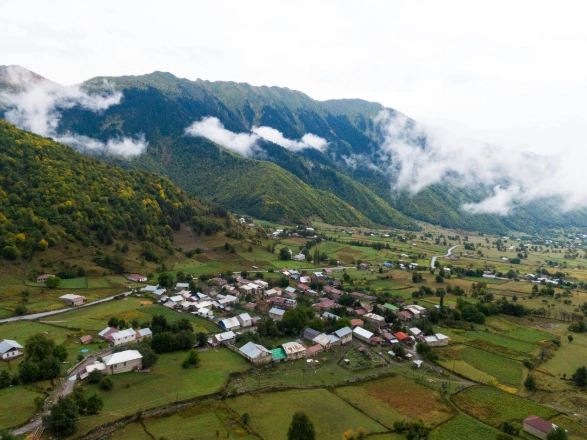
Junior Eurovision 2025 in Tbilisi In December 2025, Tbilisi will welcome young performers from across Europe for the Junior Eurovision Song Contest, turning the city into a hub of music, creativity, and international excitement. It’s a great opportunity to combine a cultural visit with the festive atmosphere of the event. Votes: https://crowch.com/vote/2907, https://crowch.com/vote/2895/statistic/, https://crowch.com/vote/2919/statistic/
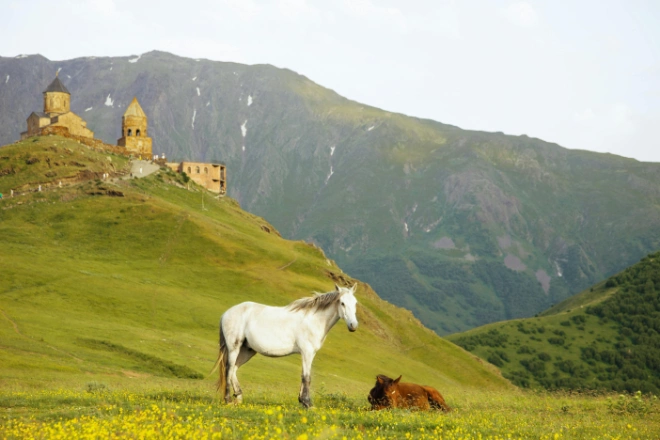
Towering above the clouds, Kazbegi — also known as Mkinvartsveri — is one of Georgia’s most iconic mountains. Once an active volcano in the Middle Pleistocene (between 2.5 million and 11,700 years ago), it is now a symbol of strength, adventure, and natural beauty. Its slopes are laced with glaciers — Suatisi, Mna, Ortsveri, and Devdaraki — and it is the birthplace of the Tergi River, the fastest in Georgia.
Climbing Kazbegi
Kazbegi is a dream for mountaineers and rock climbers, but you don’t need to be a professional athlete to ascend. With physical preparation, proper equipment, and an experienced guide, reaching the summit is achievable for many. The best climbing season runs from late summer into mid-September, when the snow thins and skies open clear. From the peak, the view stretches endlessly, rewarding every step with a panorama that stays etched in memory.
Stepantsminda and Beyond
The nearby settlement, long known as Kazbegi, is officially named Stepantsminda after St. Stephen. It was once renamed in honor of Alexander Kazbegi, a local poet and nobleman, but today both names are used interchangeably. The village is a perfect base for hiking, with highlights including the Gergeti Trinity Church, one of the most photographed landmarks in Georgia.
- Village Sno: A tiny settlement just 5 km from Stepantsminda, home to the Patriarch of Georgia and a 16th-century fortress tower.
- Juta: At 2,200 meters, one of Georgia’s highest villages, located beneath the dramatic Chaukhi mountain range.
- Dariali Gorge: An 11 km natural wonder, narrow and rocky, with a Georgian Orthodox church set dramatically in its depths.
- Upper Truso Gorge: Known for abandoned villages, colorful mineral deposits, and birch forests.
- Khada Gorge: A hidden treasure for climbers, accessible through trails that pass monasteries, rivers, and breathtaking alpine views.
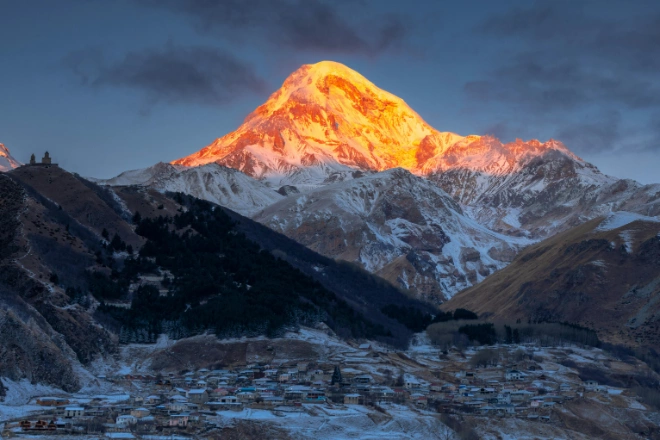
When to Visit
Kazbegi is open to travelers year-round via the Georgian Military Road. Summer (June–September) is the best time for multi-day hikes, while May to October offers ideal conditions for day trips. Winter, though harsh, paints the towers and peaks in white — a magical scene for those willing to brave the snow.
A Symbol of Georgia’s Spirit
Kazbegi is more than a mountain; it embodies Georgia’s freedom, endurance, and soul, much like the ancient Svan towers or the polyphonic songs of the highlands. And as Georgia prepares to welcome the world for the Junior Eurovision Song Contest 2025 in Tbilisi, https://crowch.com/vote/2919/statistic/, the same spirit shines through — sharing a culture that stands proudly at the crossroads of tradition and modern creativity.
Kazbegi, with its soaring peaks and timeless legends, remains a reminder that Georgia’s landscapes are as powerful and inspiring as its music, language, and people.
Sources: https://www.snoezelsontheroad.com/en/asia/kazbegi-in-georgia-6-x-things-to-do-in-the-caucasus-stepantsminda/ https://www.tourhq.com/article/interesting-facts-about-kazbegi-georgia https://georgia.travel/mount-kazbegi
Albert Einstein’s name has become more than just a reference to science — it’s a symbol of genius, independent thought, and deep human compassion.
Born in Germany in 1879, Einstein’s curiosity and skepticism set him apart early on. In 1905, his “miracle year,” he published papers that revolutionized physics. The most famous — E=mc² — forever changed our understanding of matter and energy.
But Einstein wasn’t just a physicist. He was a pacifist, a moral voice, and a fighter for justice.
Fleeing Nazi Germany as a Jewish intellectual, he settled in the U.S., warning the world about fascism’s dangers. Though he signed a letter urging Roosevelt to begin the atomic bomb project, he spent the rest of his life advocating for peace and nuclear disarmament.
“I know not with what weapons World War III will be fought, but World War IV will be fought with sticks and stones.”
Einstein also spoke out against racism in America, supported civil rights, and believed that science must be guided by ethics and empathy. His imagination, not just his intellect, made him timeless.
Even today, his theories shape physics, his words shape minds, and his integrity shapes our moral compass.

Long after his death, Albert Einstein remains one of the most iconic and enduring figures of the modern age — not just for his scientific brilliance, but for his unique perspective on life, humanity, and the universe itself. He was more than the face of relativity; he was a thinker who dared to ask the deepest questions and challenge the assumptions of his time.
Einstein’s approach to science was defined by wonder. He famously said, “The important thing is not to stop questioning. Curiosity has its own reason for existing.” Unlike many of his peers, he believed that science should not only explain how the universe works, but also deepen our appreciation of its beauty and mystery. His love for music — especially Mozart and Bach — informed this view. For Einstein, playing the violin wasn’t a distraction; it was another form of thinking.
One of his most influential contributions was his general theory of relativity, published in 1915. It redefined gravity, space, and time, and led to predictions like the bending of light by massive objects — something later confirmed during a solar eclipse. This discovery catapulted him to global fame, making him one of the first scientists to become a household name. And yet, he never embraced celebrity for its own sake. He found fame to be strange and often distracting from more serious work.
Despite his towering intellect, Einstein maintained a humble view of his place in the cosmos. He described himself as a "deeply religious nonbeliever," revering the unknown forces that governed the universe. He rejected rigid dogmas — whether scientific, political, or religious — preferring a fluid, intuitive understanding of truth. He believed imagination was even more important than knowledge, for knowledge is limited, while imagination embraces the entire world.
In his later years, Einstein remained intellectually active, even as he grew increasingly isolated from mainstream theoretical physics. He pursued a “unified field theory,” hoping to connect gravity and electromagnetism into a single framework. Though this quest remained unfinished, it symbolized his lifelong desire for coherence — in science, ethics, and life itself.
He was also deeply engaged with global affairs. He advocated for the creation of a world government to prevent war and called nationalism “an infantile disease — the measles of mankind.” He supported civil liberties and condemned authoritarianism in all forms. Letters, speeches, and essays from this period reflect a man who saw science as inseparable from social responsibility.
Students who corresponded with him often received hand-signed replies, not from an assistant, but from Einstein himself. He viewed teaching and communication as vital duties of the scientist. He once remarked, “If you can’t explain it simply, you don’t understand it well enough.” This clarity, paired with his willingness to confront difficult truths, made him a role model for generations.
Einstein’s legacy also lives on through the institutions he helped build. He was one of the founders of the Hebrew University of Jerusalem and remained committed to education as a cornerstone of progress. His archives — filled with unpublished notes, letters, and reflections — reveal not just equations and theories, but a man constantly questioning, evolving, and learning.
Today, Einstein is more than a historical figure. His name is a shorthand for brilliance, yes — but also for integrity, wonder, and the courage to think differently. Whether gazing into a telescope or standing up for civil rights, his spirit endures wherever people use their minds in service of something greater than themselves.
